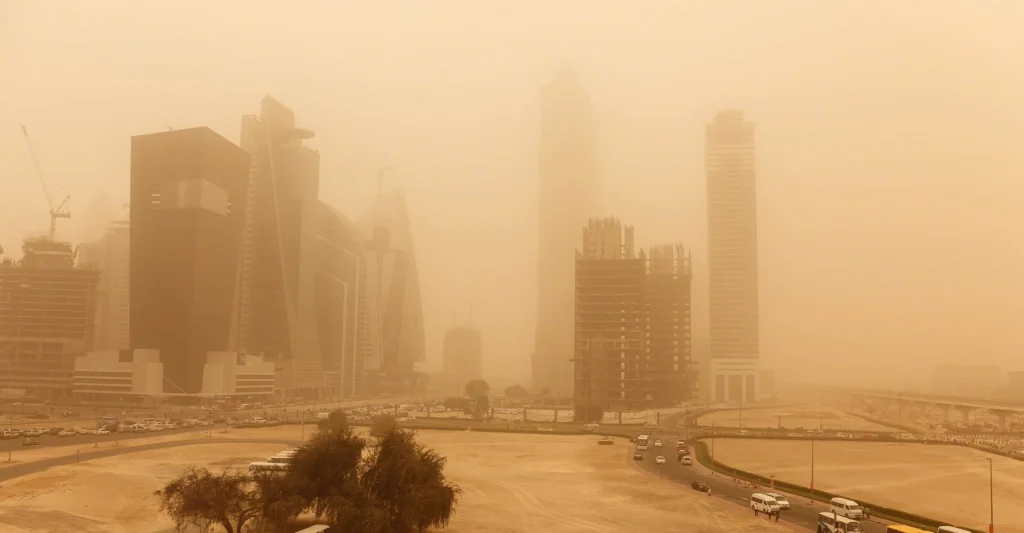Dubai, known for its stunning skyline and luxurious lifestyle, is facing a growing environmental challenge—air pollution. While the city is famous for its modern infrastructure and futuristic ambitions, the air quality tells a different story. Recent reports show that Dubai’s air pollution levels have been worsening, raising concerns about its impact on public health and the environment.
How Bad Is Dubai’s Air Quality?
Air pollution is measured using the Air Quality Index (AQI), which takes into account pollutants like particulate matter (PM2.5 and PM10), nitrogen dioxide (NO2), sulfur dioxide (SO2), and carbon monoxide (CO). A good AQI level ranges from 0 to 50, but Dubai often experiences AQI levels that go well beyond this safe zone, especially during the summer months when sandstorms add to the problem.
According to recent air quality data, Dubai has seen AQI readings frequently exceeding 150, which falls into the “unhealthy” category. In some cases, levels have spiked even higher, reaching hazardous conditions. This means that residents, especially those with respiratory conditions, are at risk of developing health problems due to prolonged exposure.

What Is Causing Poor Air Quality in Dubai?

Several factors contribute to Dubai’s declining air quality, including:
- Vehicle Emissions – With millions of cars on the roads, vehicle exhaust is one of the leading causes of air pollution. The high number of diesel and gasoline-powered vehicles contributes to nitrogen dioxide and carbon monoxide emissions.
- Industrial Activities – Factories, construction sites, and power plants release pollutants into the air, worsening air quality. Dubai’s rapid urban expansion means more construction dust and emissions from industrial zones.
- Sandstorms – Natural desert storms bring fine dust particles into the air, increasing PM2.5 and PM10 levels. These microscopic particles can penetrate deep into the lungs, leading to respiratory problems.
- Weather Conditions – Dubai’s climate plays a role in trapping pollutants. With limited rainfall, pollutants remain in the atmosphere for longer periods, leading to persistent smog and haze.
How Does Air Pollution Affect Your Health?
Long-term exposure to poor air quality can cause serious health problems. Here’s how it affects you:
- Respiratory Issues – Pollutants can irritate the lungs, leading to asthma, bronchitis, and chronic obstructive pulmonary disease (COPD).
- Heart Problems – Studies have linked air pollution to heart attacks, high blood pressure, and other cardiovascular diseases.
- Weakened Immune System – Breathing in toxic air weakens the immune system, making individuals more vulnerable to infections.
- Eye and Skin Irritation – Dust and chemicals in the air can cause redness, itching, and other irritations.
Government Efforts to Improve Air Quality
Dubai’s government has recognized the issue and is working on several initiatives to combat air pollution:
- Green Energy Transition – Dubai aims to generate 75% of its energy from clean sources by 2050 through projects like the Mohammed bin Rashid Al Maktoum Solar Park.
- Stricter Emission Regulations – Authorities have introduced emission controls for industries and vehicles, including stricter rules for diesel engines.
- Public Transport Expansion – The government is encouraging residents to use public transport to reduce car emissions. The Dubai Metro, electric buses, and ride-sharing services are part of this strategy.
- Tree Planting & Green Spaces – More trees and green zones are being developed to improve air quality and provide natural filtration for pollutants.
What Can You Do to Protect Yourself?
While the government is taking action, individuals can also adopt habits to minimize exposure to polluted air:
- Check AQI Levels Daily – Use apps or websites that provide real-time air quality updates and avoid going outside when pollution levels are high.
- Wear a Mask – When air quality is poor, wearing a mask can help filter out harmful particles, especially for those with respiratory issues.
- Use Air Purifiers – Installing air purifiers at home can help reduce indoor pollution levels.
- Reduce Car Usage – Consider carpooling, using public transport, or driving electric vehicles to help cut down emissions.
- Keep Indoor Spaces Clean – Regularly clean air filters and avoid smoking indoors to maintain good indoor air quality.
The Road Ahead
Dubai’s air quality crisis is a growing concern, but with the right policies and public awareness, improvements are possible. As the city continues to expand, balancing development with environmental sustainability will be key. Until then, residents must take proactive steps to protect themselves from harmful air pollutants.
Also read: Why Patients Are Rushing to This UAE Hospital for World-Class Treatment!













